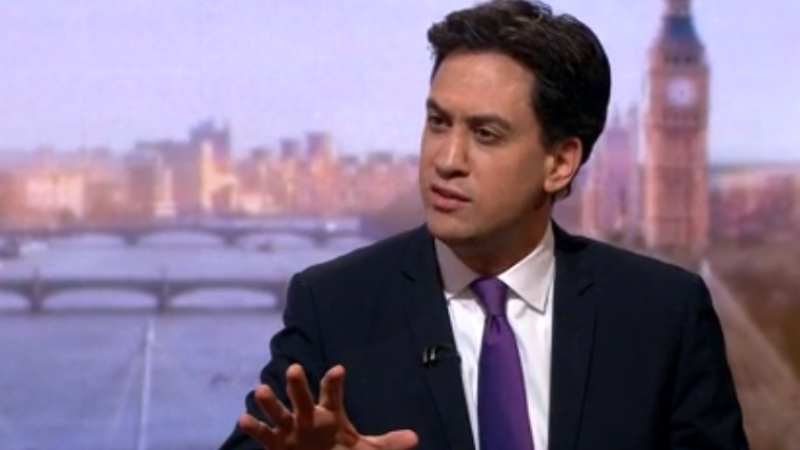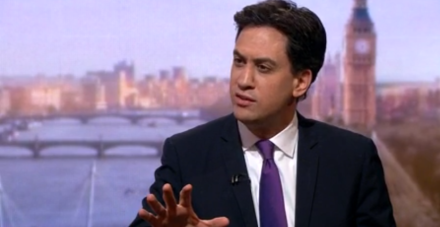
The leader of the Labour Party showed up on Saturday and gave a good speech. It is worth reading in full. The speech was cogent, incisive, and pointed. After a difficult autumn, when questions were asked about Ed Miliband’s leadership, here was a solid answer. Labour party candidates and campaigners now have a clear text to work from. And if that isn’t providing leadership, what is?

The journey that aspiring prime ministers go on involves a few unavoidable steps. There is early naivety and hope, followed by doubts as the road becomes more arduous, and a necessary toughening up as old friendships are tested and new priorities are set. As the reality of the task sinks in any lingering frivolity is put to one side. It may not be necessary, or even wise, to go on a full Prince Hal/Henry V transformation:
Presume not that I am the thing I was,
For God doth know, so shall the world perceive,
That I have turn’d away my former self
(Henry IV part 2, Act v Scene v)
But it should be no surprise if things start getting a bit more serious from now on.
So on Saturday, instead of the more free-wheeling, look-no-notes speeches of the past, it was a carefully delivered, Autocue-enabled address. And the words on the Autocue were good words, and the speaker hit the right peak of indignation at the moment he wanted most attention, and that clip duly made it onto the news bulletins:
“We wake up this morning and we now hear the Prime Minister thinks ‘Britain needs a pay rise’. I think that sound we are hearing is people across the country choking on their cornflakes. This is someone who has spent months and years telling us there was no cost of living crisis, and then if there ever was one, it had been fixed. You couldn’t make it up. Five years of denial, complacency and failure on living standards, and less than four months before an election, he claims to have woken up to the problem. Who is he trying to kid? You can’t wipe out five years of failure on living standards with pre-election pleading.”
This was all good. The content was good. But the tone? We need more.
Economists talk about the “feel-good factor”, that elusive sense of financial well-being. In spite of technical recovery there is little of it about. Successful politicians, even in tough times, manage to provide it. As Bill Clinton said at the “Inclusive Capitalism” conference in London last year: “The most important thing for people everywhere is to believe that tomorrow can be better than today.”
Of course: Clinton. It is a bit predictable that this topic forces us to think about him again. But no leading politician in the Anglosphere since Reagan has had such a remarkable ability to spread warmth and optimism. And, with the exception of JFK, there has been no more powerful or effective public speaker than Clinton in the post war era.
Some readers may have seen “Bubba” address the Labour party conference in Blackpool in 2002. I got to see him four years later at London’s Guildhall, speaking at a Smith Institute event. Showing unBritish assertiveness I managed to get close to the stage.
Clinton gave a terrific performance. He has an almost spooky, metaphysical gift – the ability to communicate, apparently personally, with a hall containing hundreds or even thousands of people. You felt that he was talking to you directly. It was invigorating stuff – a pipe-cleaner through the brain.
And crucially, even though his subject matter ranged from war to disease to catastrophic climate change, he turned it around into an optimistic conclusion. “Do you really think the 21st century is going to be worse than the 20th century?”, he asked with that winning smile. Had a show of hands been taken, Bill would have received North Korean levels of support at the end.
There’s only one Bill Clinton, and he has set the bar too high for everybody else. But it is something to aim for. So when Miliband argues that the Conservatives are gloomy pessimists about the future, and that Labour is the optimistic party, he has to show it as well as say it. The trouble with the disciplined and tightly controlled Autocue experience is that it can put distance between the speaker and the audience. Clinton, giving a speech he had of course delivered 100 times, made it sound spontaneous as well as heartfelt.
Here’s another predictable quote, from EM Forster, one that I like so much I know I’ve inflicted it on you before:
“Only connect the prose and the passion, and both will be exalted.”
Miliband’s words are good. But it is time to show as well as tell.




More from LabourList
Restoration announce recommendations for NEC candidates
‘Factionalism at the top is weakening Labour – and handing a gift to Reform’
‘Europe must stand strong on its own as US security guarantees grow conditional’